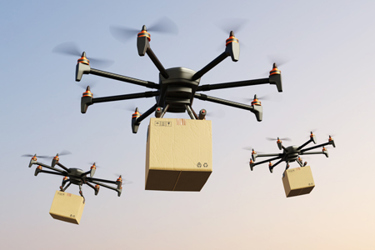The Rise Of AI-Powered Drones In Clinical Logistics And Supply Chains
By Joseph Pategou

Clinical trial logistical challenges — including delays in drug distribution and compromised biological samples due to improper storage — pose significant barriers to accessing care and advancing therapies.
The World Health Organization (WHO) estimates that at least 1 in 10 medicines in low- and middle-income countries are substandard or falsified, resulting in $30.5 billion in annual losses. This highlights the urgent need for more efficient and reliable medical supply chains.1
Drone technology has significantly advanced since the 2010s, benefiting from improved connectivity, GPS accuracy, AI, and machine learning. These innovations have fueled the rapid growth of the global medical drone market, which reached $1.47 billion in 2024 and is projected to expand at a 15.3% compound annual growth rate (CAGR), reaching $4.68 billion by 2032.2
As the use of artificial intelligence (AI) and drones grows, these technologies are reshaping the medical supply chain, offering new solutions to long-standing problems. In this article, I’ll provide examples of drones delivering to hospitals, which are common clinical trial sites.
Enhancing Efficiency and Access
Proper collection, handling, and storage are vital to maintaining sample integrity of biospecimens and ensuring research success. Temperature control during transportation is particularly critical, as fluctuations can compromise sample viability. Drones offer a fast, efficient solution for biospecimen collection and delivery, especially in remote or hard-to-reach locations.
Recent studies highlight the impact of drones on medical supply chains, particularly in reducing delivery times, minimizing stockouts, and lowering waste. A Lancet study funded by the Canadian Institutes for Health Research found that drone deliveries significantly reduced transport times and decreased blood product wastage by 67%. Monthly blood product expiration dropped by approximately seven units after the introduction of drones, improving supply efficiency for healthcare facilities.3
Similarly, a three-month study on drone medical deliveries funded by the Bill & Melinda Gates Foundation demonstrated notable improvements in vaccine and medical supply availability. Facilities using drones saw a 60% reduction in vaccine stockouts, with stockout durations dropping from 5.3 days in control facilities to just 3.2 days. Drones also reduced the number of days without a product by 5 days compared to 45 days in the control group, representing an 11% drop. For products that facilities chose to stock, there was a 3-day reduction in number of days without a product, compared to 14.4 days in the control group.4
Rural areas in the United States often face significant challenges due to limited and delayed access to healthcare resources. With vast distances between medical facilities and courier deliveries occurring only once or twice a day, healthcare professionals lose valuable time waiting for essential supplies. When shortages affect the availability of blood products, urgently needed medications, diagnostics, or small medical devices, the consequences can be severe. To address this issue, Wingcopter, Spright, and Hutchinson Regional Medical System launched a partnership in 2021 to implement drone-based medical deliveries. This initiative connects healthcare facilities to a laboratory 26 miles away, cutting transport time from a 45-minute drive to just 29 minutes. By improving efficiency and reducing delays, drone technology is transforming medical logistics in rural America.5
Company Spotlight: Zipline
Zipline, the world’s largest autonomous delivery service, was founded in 2014 and began commercial operations in 2016, initially serving a single hospital in Rwanda. Since then, it has transformed medical logistics in the country, partnering with healthcare centers to deliver essential drugs and transport blood samples for analysis. This allows for the speedy transfer of patient samples between facilities, on-demand delivery at a lower cost than traditional ground logistics, reduced product loss or spoilage through an end-to-end cold chain, and enhanced security with advanced chain-of-custody tools.6
Today, Zipline serves 84% of all Rwandan hospitals and health facilities, transporting 75% of the country’s blood outside the capital — many of these locations being remote or difficult to access. In some cases, its drone deliveries have cut drug transport times from three hours to just 15 minutes, significantly improving clinical logistics and supply chains.7
In 2023, Zipline expanded its impact in the U.K. by partnering with the National Health Service (NHS) and Apian. This initiative utilizes electric, autonomous drones to streamline the healthcare supply chain, ensuring hospitals receive critical medical supplies and prescriptions on demand. As part of this effort, Zipline will centralize the inventory of frequently ordered products, such as prescription medicines, and deliver them within minutes to regional health facilities. To support operations, Zipline will establish a hub near the Northumbria Specialist Emergency Care Hospital in Cramlington, Northumberland. Its fleet of fixed-wing, fully autonomous aircraft is equipped with advanced technologies, including artificial intelligence. Capable of traveling up to 130 miles roundtrip in almost any weather, these drones deliver packages via parachutes that gently descend to designated hospital drop zones. Ultimately, Zipline, Apian, and the NHS aim to serve over 30 healthcare facilities, reducing reliance on costly last-minute logistics and improving patient care.8
Company Spotlight: Matternet
Matternet, a U.S.-based drone company, specializes in ultra-fast, seamless healthcare delivery. In 2022, the company launched a groundbreaking drone delivery route in Zurich, Switzerland, connecting hospitals to one another and to laboratories. With Matternet’s drone system, transportation between hospitals and labs now takes just seven minutes. Traditionally, hospitals have relied on ground transport, sending large batches of medical products via cars or vans, often leading to significant delays. This method not only disrupts workflow with overwhelming influxes of deliveries but also places a heavy burden on staff. For small numbers of patients requiring medication, hospitals have typically relied on vehicle-based couriers, which can be even slower and less efficient.9
Matternet also has expanded its operations to Germany, receiving approval from the Federal Aviation Office to deploy its M2 drone delivery platform. The system connects hospitals to one another and to laboratories, enabling the rapid transport of critical lab samples but also drugs. As Europe’s largest hospital, Labor Berlin processes over 6 million medical products and samples annually across 30 hospitals. Once fully operational, Matternet’s network will significantly enhance medical products delivery and diagnostics for millions of patients.10
Moving Into The Future
These advancements in the medical supply chain are made possible by AI-driven algorithms that enhance drone capabilities, enabling advanced route planning and adaptive flight systems. These intelligent technologies continuously monitor flight paths, detect potential risks, and adjust flight patterns to ensure efficient and secure deliveries while proactively addressing issues before they disrupt operations. Additionally, AI-powered predictive maintenance minimizes downtime by identifying potential malfunctions early, ensuring drones remain in optimal condition. As drone technology continues to evolve, AI integration will further enhance precision, reliability, and scalability in clinical trial logistics and medical supply chains.11
Drones and AI are revolutionizing clinical logistics by enhancing efficiency, reducing waste, and expanding access to medical supplies. These technologies streamline drug delivery, optimize supply chains, and accelerate clinical trial processes. As investments in AI and drone technology continue to grow, their role in healthcare will expand, enabling faster, more precise collection, handling, and storage of medical products. This advancement is particularly crucial for improving access to essential medicines and facilitating biospecimen collection and delivery in remote or hard-to-reach locations worldwide.
References
- World Health Organization (WHO). (n.d.). Substandard and falsified medical products. Retrieved from https://www.who.int/news-room/fact-sheets/detail/substandard-and-falsified-medical-products
- Fortune Business Insights. (n.d.). Medical drone market report. Retrieved from https://www.fortunebusinessinsights.com/medical-drone-market-105805
- The Lancet Global Health. (2022). Scaling up drone-based medical deliveries in Africa: The future is now. Retrieved from https://www.thelancet.com/journals/langlo/article/PIIS2214-109X(22)00048-1/fulltext
- IDinsight. (2022). Zipline brief: Impact of drone delivery on healthcare in Rwanda. Retrieved from https://www.idinsight.org/wp-content/uploads/2022/06/Zipline-Brief-FINAL-Digital-v3.pdf
- Wingcopter. (n.d.). Air Methods and Wingcopter partnership for drone-based medical deliveries. Retrieved from https://wingcopter.com/air-methods
- Zipline. (n.d.). Impact of Zipline’s medical drone deliveries. Retrieved from https://www.flyzipline.com/newsroom/stories/impact
- Time. (n.d.). Rwanda’s drone revolution: How Zipline is transforming medical deliveries. Retrieved from https://time.com/rwanda-drones-zipline/
- Zipline. (n.d.). NHS to scale up drone delivery program of critical medical supplies using Apian and Zipline. Retrieved from https://www.flyzipline.com/newsroom/news/announcements/nhs-to-scale-up-drone-delivery-program-of-critical-medical-supplies-using-apian-and-zipline
- Business Wire. (2022, December 12). Matternet launches world’s longest urban drone delivery route connecting hospitals and laboratories in Zurich, Switzerland. Retrieved from https://www.businesswire.com/news/home/20221212005097/en/Matternet-Launches-World’s-Longest-Urban-Drone-Delivery-Route-Connecting-Hospitals-and-Laboratories-in-Zurich-Switzerland
- Business Wire. (2023, December 12). Matternet receives authorization from the German Aviation Office to launch BVLOS drone delivery operations in Berlin. Retrieved from https://www.businesswire.com/news/home/20231212271453/en/Matternet-Receives-Authorization-from-the-German-Aviation-Office-to-Launch-BVLOS-Drone-Delivery-Operations-in-Berlin
- eVTOL Insights. (2023, July). The use of AI in Zipline’s drone delivery structure. Retrieved from https://evtolinsights.com/2023/07/the-use-of-ai-in-ziplines-drone-delivery-structure/
About The Author:
 Joseph Pategou has authored over 30 articles in publications such as Cell and Gene Therapy, The Indian Economist, Labotech.eu, Drug Discovery & Development, and others. A former consultant at Boston Consulting Group in New York, he has held and continues to hold operational roles in biopharma companies. The views expressed are his own. He holds an MBA from New York University and a master’s degree from HEC Paris.
Joseph Pategou has authored over 30 articles in publications such as Cell and Gene Therapy, The Indian Economist, Labotech.eu, Drug Discovery & Development, and others. A former consultant at Boston Consulting Group in New York, he has held and continues to hold operational roles in biopharma companies. The views expressed are his own. He holds an MBA from New York University and a master’s degree from HEC Paris.
